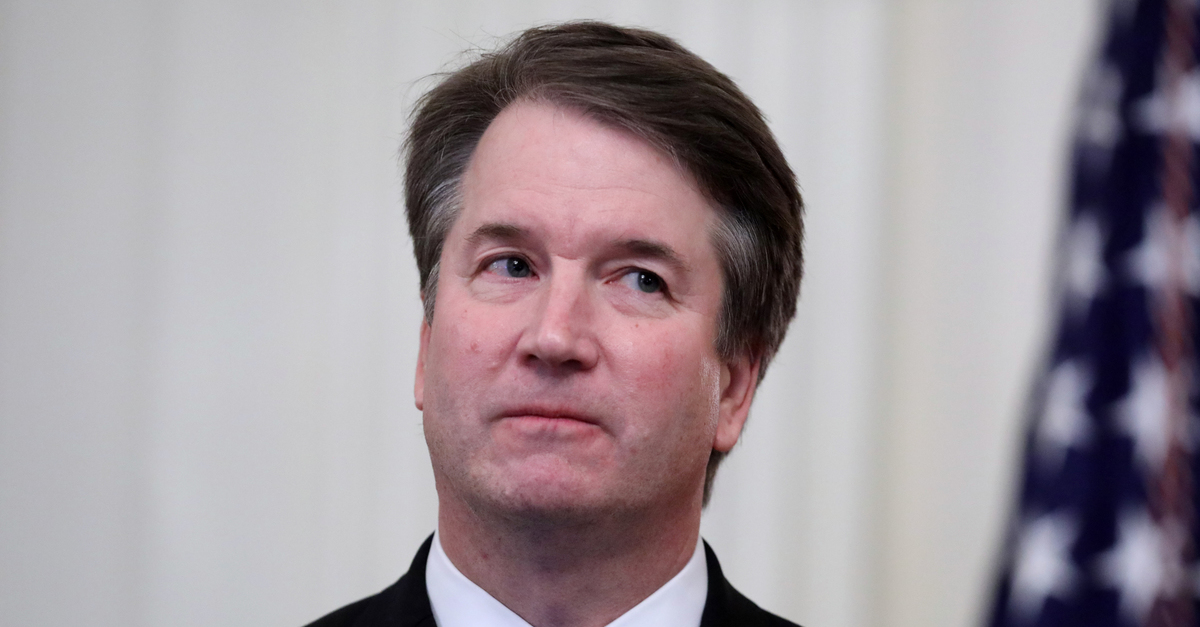
U.S. Supreme Court Justice Brett Kavanaugh conceded error on Thursday by correcting one of his mistakes from a concurrence issued earlier this week in a case that barred Wisconsin election officials from accepting mail-in ballots that arrive after Election Day.
The minor edit was made after Vermont, the state implicated by the mistake, demanded a correction in a letter posted–and widely shared–on social media and sent to the high court’s clerk.
The concurring opinion was widely criticized for its multiple errors of fact, decided misrepresentations and especially due to a few cherry-picked lines from a law review article—an article which Kavanaugh cited to support his argument against extended mail-in ballot deadlines but which actually made the exact opposite point about such deadlines.
But that was all Monday and Tuesday. Then came Wednesday.
Vermont Secretary of State Jim Condos (D) sent a polite and formal letter to Supreme Court Clerk Scott Harris documenting Kavanaugh’s mistake and posted a less formal viral tweet which dunked on the conservative justice for his “erroneous claim” about the Vermont making no changes to election rules.
“States such as Vermont, by contrast, have decided not to make changes to their ordinary election rules, including to the election-day deadline for receipt of absentee ballots,” Kavanaugh wrote in his Monday evening concurrence to the opinion which struck down a federal court’s proposed post-Election Day ballot return deadline.
In fact, Vermont made two major changes to their electoral administration in order to accommodate voters concerned about or harmed by the ongoing coronavirus (COVID-19) pandemic.
“First, beginning on Sept. 18, Vermont mailed every active registered voter a ballot and a prepaid return envelope,” Condos explained in the semi-open letter. “Second, given that more Vermonters are voting early and by mail than in a typical election year, I authorized Local Election Officials to begin processing such ballots confidentially and with strict security during the 30 days preceding the election in order facilitate timely results.”
Condos went on to “respectfully ask that the record is corrected to reflect” that “Vermont is not an accurate comparison” for either Wisconsin or “for the assertion Justice Kavanaugh has made.”
Kavanaugh, with little fanfare or attention, obliged the request.
By late Wednesday evening, the opinion had been changed to note that Vermont had not changed their election–deadline rules.
“States such as Vermont, by contrast, have decided not to make changes to their ordinary election-deadline rules, including to the election-day deadline for receipt of absentee ballots,” the corrected passage now reads. Notably, the Supreme Court’s link to Kavanaugh’s original concurrence is no longer active.
Vermont, however, is still a bit less than pleased.
“Justice Kavanaugh simply got this wrong,” Condos said in a statement on Thursday. “I’m glad he admitted a mistake and modified his opinion, but a one-word addition doesn’t go far enough.”
“I will not sit idly by while Justice Kavanaugh uses factually incorrect information about the Green Mountain State as cover to erode voting rights in the middle of a pandemic-distressed election,” he continued. “The opinion still misrepresents the significant changes we made here in Vermont to ensure every vote counts in the middle of a global pandemic, so that no voter has to choose between their health and their right to vote.”
The Condos statement continues on in the following manner:
Let me be clear: the larger problem with the Justice’s concurring opinion, and the majority opinion largely, is not the absence of the word “deadline,” it is the total lack of regard for the voting rights of American citizens.
This Supreme Court decision repeats the misinformation we, as Chief Elections Officials, have been fighting against all election season: that votes cast on election day and arriving afterward are somehow not valid or are lesser than votes cast in person. That is simply not true.
This is how elections have worked for decades. In many states, it is normal for absentee votes to arrive after election day. This is particularly common for our overseas and military voters.
Red states and blue state across this country allow it so that every vote can be counted, within reason.
In a democracy, we count every single legitimate vote cast by an eligible voter. Period.
“Facts matter,” the secretary of state’s acerbic statement concludes.
[Image via Chip Somodevilla/Getty Images]
Have a tip we should know? [email protected]